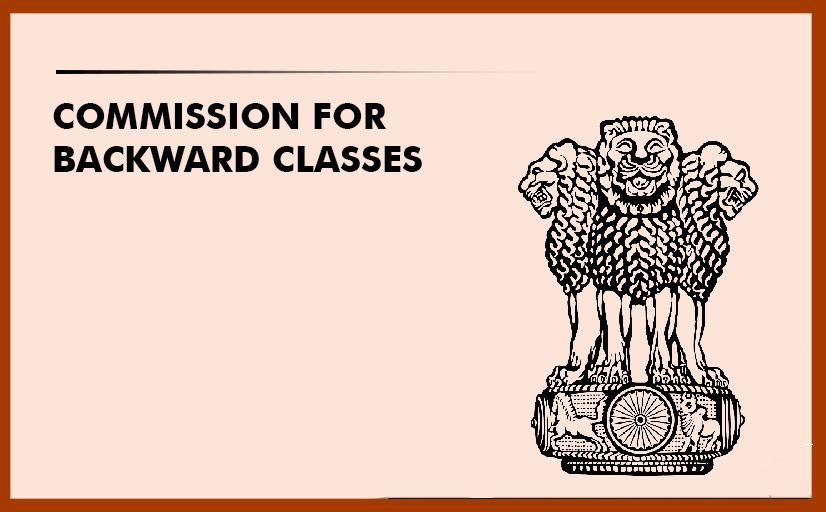
National Commission for Backward Classes (NCBC)
The 102nd Constitution Amendment Act of 2018 gives the National Commission for Backward Classes constitutional status (NCBC).
National Commission for Backward Classes (NCBC)

What precisely is the National Commission for Backward Classes (NCBC)?
- The 102nd Constitution Amendment Act of 2018 gives the National Commission for Backward Classes constitutional status (NCBC).
- It has jurisdiction over investigating complaints and welfare measures involving socially and educationally disadvantaged groups.
- The NCBC was once a statutory entity under the Ministry of Social Justice and Empowerment.
What is the history of the National Commission for Backward Classes (NCBC)?
- Kaka Kalelkar and B.P Mandal appointed two Backward Class Commissions in the 1950s and 1970s, respectively.
- The First Backward Classes Commission is another name for the Kaka Kalelkar Commission.
- The Supreme Court asked the government to establish a permanent committee to entertain, examine, and propose the inclusion and exclusion of various Backward Classes for benefits and protection in the Indra Sawhney case in 1992.
- In accordance with these directives, the National Commission for Backward Classes Act was established by Parliament in 1993, establishing the NCBC.
- The 123rd Constitution Amendment Bill of 2017 was submitted to Parliament to protect the poor's interests better.
- Parliament also enacted a separate measure to annul the National Commission for Backward Classes Act of 1993, making the 1993 Act obsolete once the bill was passed.
- In August 2018, the President signed the measure, which granted NCBC constitutional standing.
What is the OrganizationalOrganizational Structure of NCBC?
The Commission comprises five members: a Chairperson, a Vice-Chairperson, and three additional Members appointed by the President by warrant under his hand and seal.
The President determines the terms of service and length of office for the Chairperson, Vice-Chairperson, and other Members.
What are the NCBC Constitutional Provisions?
- Article 340 addresses the necessity to identify "socially and educationally backward classes," explain the causes of their backwardness, and provide solutions to alleviate the challenges they encounter.
- The 102nd Constitution Amendment Act added articles 338 B and 342 A.
- Article 366 is also altered by the modification.
- Article 338B empowers the NCBC to investigate complaints and welfare measures involving socially and educationally disadvantaged groups.
- Article 342 A gives the President the authority to designate socially and educationally backward groups in various states and union territories.
- He can do so in conjunction with the Governor of the relevant state.
- Furthermore, if the list of backward classes is to be modified, Parliament must pass legislation.
What are the NCBC's powers and functions?
- The Commission investigates and supervises all topics pertaining to the protections established for the socially and educationally backward groups under the Constitution or any other law to assess such safeguards' effectiveness.
- It takes part in and advises on the socioeconomic development of the socially and educationally backward strata and evaluates their progress under the Union and any State.
- It reports on the operation of such safeguards to the President annually and at other times as the Commission deems appropriate. The President presented these reports to each House of Parliament.
- A copy of any such report, or any part of it, should be provided to the State Government if it pertains to any topic with which the State Government is concerned.
- NCBC must carry out any additional tasks related to the protection, welfare, development, and progress of the socially and educationally backward groups that the President may designate by regulation, subject to the terms of any legislation established by Parliament.
- While trying a case, it has all the powers of a civil court.
What distinguishes the New Commission from its predecessor?
- The new statute recognizes that, in addition to reserves, BCs require development. The legislation includes provisions for the development of Socially and Educationally Backward Classes (SEdBCs) as well as the role of the new NCBC in the development process.
- The new NCBC has been tasked with the added responsibility of resolving backwards-class grievances.
- Article 342(A) increases openness by requiring Parliament's approval before adding or removing any community on the backward list.
- Aside from listing inclusion and reservation, thorough and holistic growth and advancement of each group toward equality in all criteria of development and welfare are required.
What are the Root Causes?
- It is anticipated that the new National Commission for Backward Classes will need more credible and effective social justice architecture.
- The advice of the new NCBC does not bind the government.
- It cannot handle the current dilemma of demands from diverse castes to be classified as BCs because it has no obligation to define backwardness.
- By preserving the last general name of NCBC and detaching the body from its soul (Article 340), the administration laid the ground for the entire structure of special constitutional safeguards to be jeopardized.
- The Supreme Court-mandated features of expert bodies are separate from the new NCBC.
- As recent statistics show a lopsided representation of SC/ST and OBC groups, mere constitutional status and further acts would not alleviate the problem at the grassroots level.
- The SC directive on periodic updating of the backward class list in collaboration with the NCBC must be addressed under Article 338B (5).
The Future Perspectives -
- The composition should represent the characteristics of an expert panel, as ordered by the Supreme Court.
- The government must make public the caste census findings and the panel's recommendations.
- The composition of the Commission should reflect gender sensitivity and stakeholder representation.
- Vote bank politics should give way to value-based politics so that only the most disadvantaged members benefit from the reservation.
